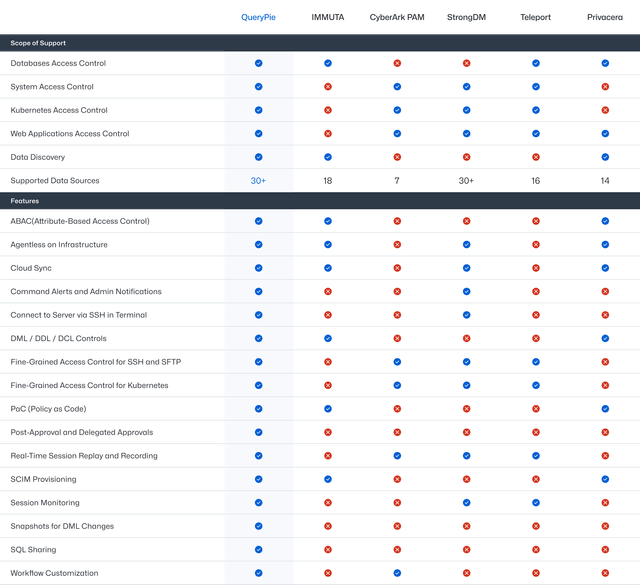最も難しいと言われるグローバル展開、QueryPieはなぜ確信しているのか?
November 22, 2024
はじめに
韓国におけるグローバルビジネスの拡大は、多くの企業にとって必然的かつ重要な課題となっています。特に、韓国市場の限られた成長性や規模を考慮すると、グローバル市場への進出は自然な選択肢と言えます。しかし、全く異なる環境で成功したビジネスを運営するためには、予測できない多くの変数や複雑な戦略的意思決定を乗り越える必要があります。私は約20年間、さまざまな業界でグローバル展開に関わってきましたが、その経験を通じて、グローバル市場で成功するために必要かつ重要な要素や成功要因を見出してきました。この視点から、QueryPieがグローバル市場で成功する可能性が高い理由について説明したいと思います。
グローバル展開の課題
グローバル展開が難しい理由は多岐にわたりますが、特に以下の4つの要素が主要な課題として挙げられます。1) 市場に対する正確な理解と明確な市場ポジショニング、2) 事業に対する深い理解に基づいた人材の確保、3) 最適なパートナーシップおよび投資構造、そして 4) 成果を待つ忍耐力です。これらの要素は、新しい環境で既存の成功の方程式をそのまま適用することができないことを示しています。成功するためのグローバル拡張には、市場の特性や競争環境に合わせた独自の戦略が求められます。
この記事では、「市場に対する正確な理解と明確な市場ポジショニング」に焦点を当てます。
QueryPieのグローバル成功の可能性

成長潜在力の大きいグローバル市場
QueryPieが注目するグローバルサイバーセキュリティ市場は、特にアメリカが主導しています。特に日本では、多くのセキュリティソリューションがアメリカに依存している状況です。例えば、クラウドサービス市場において、AWS、Azure、GCPといったアメリカ企業が世界中で支配しているように、セキュリティソリューションも世界中の多くの企業がアメリカのソリューションを利用しています。その結果、アメリカの大きな市場規模に基づき、多くの経験が蓄積されるため、アメリカ以外の国で開発されたソフトウェアがグローバル市場で競争優位を持つことは容易ではないのが現実です。もちろん、イスラエルは多くのサイバーセキュリティソリューション企業で競争優位を持っていますが、ほとんどはアメリカの資本を背景に、主にアメリカ市場をターゲットにしています。
QueryPieが目指すデータベースおよびIT資産アクセス制御市場は、VPN、EDR、CNAPPなどの既存のセキュリティソリューションとは異なる特性を持っています。韓国市場はデータセキュリティ規制が強化されており、成熟した市場として位置づけられていますが、海外市場はまだ初期段階にあります。また、AI、クラウド、さまざまなSaaSソリューションによるITインフラの変化は、この市場の成長可能性をさらに高めています。市場の観点で最も規模が大きいアメリカと日本に比べて、韓国市場での経験がより多くあるケースは非常に稀です。
QueryPieの差別化された競争力
QueryPieの核心的な競争力は、統合されたアクセス制御ソリューションにあります。QueryPieは、データベース、サーバー、Kubernetes環境における3つのアクセス制御ソリューション(DAC、SAC、KAC)を1つのプラットフォームで統合して提供しています。今年(2024年)末にWACがリリースされると、4つのアクセス制御ソリューションが統合的に管理されることになります。従来、各ソリューションは個別に提供されることが多かったですが、QueryPieはすべてのIT資産に対して一貫したポリシーを適用し、監視できるようにすることで、管理の効率性とセキュリティ性の両方を強化しています。
QueryPieは、韓国の厳しいセキュリティ規制環境で培った経験を基に、グローバル市場でも競争力を持っています。QueryPie Japan代表の有延は、「日本が地震対応建設技術では世界で最も優れた技術を持っているように、韓国のデータセキュリティ経験がQueryPieの差別化された競争力である」と述べ、韓国での経験が日本だけでなく他の国々でも高い信頼性を確保する手助けになると強調しています。韓国の顧客が求める要求水準を満たすことができれば、グローバルな顧客の要求にも容易に対応できると考えています。
さらに、QueryPieは、グローバルなトップレベルのセキュリティソリューションおよびクラウドサービスと非常に密接に連携しています。クラウドネイティブ技術に対する理解が深いことは、急速に変化する技術への対応力と、ソリューションの変化スピードの速さを意味しています。
グローバル成功のための挑戦と戦略
市場理解とマーケットポジショニング
QueryPie がグローバル市場で直面する最初の課題は、現地市場のニーズを把握し、データベースアクセス制御に対する具体的な必要性を理解することです。各国のセキュリティ規制とITインフラの変化速度は異なり、それを反映した戦略的なマーケットポジショニングが求められます。
各国ごとに異なるデータセキュリティ規制やコンプライアンス要件に迅速に対応することも重要な課題です。データセキュリティソリューションとしての信頼性を確保するためには、各国の法令や規制を徹底的に遵守することが不可欠です。
事業の成功において最も重要な部分の一つは、適切なタイミングを見極めることです。結局、各国の規制の変化のレベルやトレンドを理解し、それを受け入れる顧客の対応レベルを先取りして把握することが、成功確率を高めるために最も重要な要素だと考えています。QueryPie が日本を最初の進出国として選んだのも、現在の日本の規制変化の方向とクラウドへの移行という市場の変化を数多くのミーティングを通じて把握したからです。
アメリカ市場の場合、データベースアクセス制御に対する認識や理解度は低いですが、今後最も大きな市場に拡大する潜在能力を持っています。2024年6月にニューヨークで行われた会議では、競合するJumpwireやTheomといった企業が、QueryPie が提供するレベルの詳細なアクセス制御を真剣に検討している唯一の企業のようでした。それでも、対応するデータソースの多様性や外部ソリューションとの連携性は、非常に不十分なようです。まだアメリカ市場の顧客の要求事項は韓国の顧客に比べて低い水準ですが、上記の会社が市場に登場していることを鑑みると、市場の変化に注視する必要があります。

QueryPie競争力比較表
グローバルを大きくアメリカ、日本、東南アジア、ヨーロッパ、中国、オーストラリアなどに分け、それぞれの市場がどのように関連しているのかを理解することが非常に重要です。これを実現するためには、現場での実際の声を聞き、政策の変化をモニタリングする努力が必要です。実際の顧客の声を聞くこと以上に重要なことはありません。
終わりに
QueryPie は急速に変化するグローバルIT環境の中で、データベースおよびIT資産アクセス制御ソリューションの需要増加と規制の変化に適切に対応し、韓国市場で積み上げた経験をもとにグローバル市場で有利な位置を占める潜在能力を持っています。成功するグローバル拡張のためには、市場の成長可能性に対する深い理解、規制の変化に対する迅速な対応、そしてローカライズされた戦略を通じて競争力を確保することが必要です。